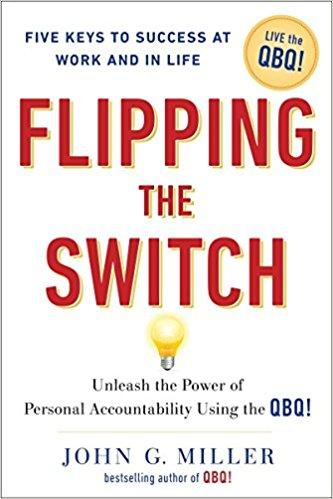Flipping The Switch Summary
5 min read ⌚
 Unleash the Power of Personal Accountability Using the QBQ!
Unleash the Power of Personal Accountability Using the QBQ!
Let’s be honest for a second.
Do you sometimes find yourself in situations in which you play the blame game, and wait for someone else to solve your problems?
We have all been there. But it is not a productive place to spend your life at.
Read our summary of “Flipping The Switch” to find out why the blame game will take you nowhere, and what you can do to awaken the sense of personal accountability.
Who Should Read “Flipping The Switch”? and Why?
In this sequel to “QBQ! The Question Behind the Question”, John G. Miller motivates you to stop whining and talking about your problems, and start looking for solutions instead.
If you are looking for a quick-read from the self-help genre, and if you have no problem with admitting you need to change your behavior, we recommend “Flipping The Switch” to you.
It is a book which will show you the path toward solving your problems.
About John G. Miller
 John G. Miller is an author, speaker, and owner of an organizational development company.
John G. Miller is an author, speaker, and owner of an organizational development company.
“Flipping The Switch Summary”
We have four words for you that will change your life: Ask the “Question behind the question.”
In other words, it’s time for you to flip the switch.
Let us illustrate this for you.
When you switch on a light, energy flows and illuminates everything that surrounds you.
QBQ is just like a light switch since it fuels the process that takes you to that internal source of energy, which is your personal accountability.
Okay, but what is the QBQ?
We’ll quote this: “The QBQ is a tool that helps leaders at all levels practice personal accountability by asking better questions and making better choices at the moment.”
What this means is that you can shape your understanding by posing questions you intentionally design. Those questions will serve you to comprehend what is really going on around you and to find a way to fix it.
So, it is time to stop asking yourself why you have such bad luck, or why all bad things happen to you since those thoughts are externally focused. And, as you know, external circumstances can rarely, if ever, be changed.
That is why it is much more productive for you to concentrate on yourself – wake up that personal accountability in yourself.
Questions like: “What can I do about this issue” or “What was my role in creating this problem” will lead to much better results.
Why is that so?
Well, whenever you play the blame game and point fingers, you are not exactly looking for a solution, but you are trying to find ways to avoid your own accountability.
Blaming others may be more comfortable at the moment for your ego, but it accomplishes nothing.
So, instead of waiting for others to fix the problems, do it yourself.
Your transformation toward a more accountable person begins when you start asking the right questions. When you do, it is time to put the five advantage principles to work.
The first advantage principle is learning. You need to get into a learning mindset, which will allow you to evolve, grow, set better and higher goals and reach them. This process will make you feel worthy and accomplished.
The second advantage principle is ownership. We are talking about owning situations, in which cases you exhibit personal accountability. Taking ownership is the opposite of looking for excuses, and it is the first step toward finding solutions.
The third advantage principle is creativity. Now, “creativity” has lost its true meaning since people mostly use it for skills in the context of art. However, you can practice creativity in all areas of your life, including your work, as well as the paths you take toward achieving your goals.
When you let yourself be creative, you continuously work on finding solutions even to issues which made other people give up.
The fourth advantage principle is service. Good service builds and reinforces trust and loyalty. But it is not only good for the relationships – but it also gives the person performing the service a sense of value.
So the next time you feel someone is “demanding,” stop it, and shift the mindset towards finding ways to be of help, and understanding others’ needs.
Finally, the last principle is trust. Trust is the foundation of every relationship you mold either in your personal or professional life.
When people are trusting each other they are more open to sharing ideas and experiences, which in higher productivity, creativity, and collaboration. Of course, all that leads to better outcomes.
Hence, make it your mission to build trust with those that surround you.
Look out for two sings that can show you whether your organization’s trust is eroding: suspicion and resistance.
In other words, when the employees do not wish to speak out their opinions and present their concerns and suggestions – you have a problem.
By following the advantage principles we just briefly explained, you will create stronger bonds and nurture relationships that are the most significant in your life.
So now, all that it is left is for you to ask yourself what things will you do at this very moment that will take you a step further toward waking up the accountable side of yourself.
Key Lessons from “Flipping The Switch”
1. Steps to Put the QBQ to Work
2. Obstacles on the Path to Learning
3. Building Blocks to Recreate Trust in Your Organization
Steps to Put the QBQ to Work
-
- Ask yourself questions beginning with “how” or “what.”
-
- Stop pointing at others and focus your questions on yourself. Use “I” and not “they” or “you.”
- Come up with questions that point toward taking different courses of action.
Obstacles on the Path to Learning
-
- “Exception mentality.”
-
- “Expectations”
-
- “Entitlement thinking.”
-
- “Experience trap.”
- “Exclusion”
Building Blocks to Recreate Trust in Your Organization
-
- “Tell the truth.”
-
- “Speak to the right person.”
-
- “Coach”
-
- “Transfer authority.”
-
- “Support people’s dreams.”
- “Show you care.”
Like this summary? We’d Like to invite you to download our free 12 min app, for more amazing summaries and audiobooks.
“Flipping The Switch” Quotes
Facing an obstacle and coming up with another way to reach the goal is creativity at its finest. Share on X By bringing responsibility, ownership, and action to life, the QBQ helps each of us think - and act - like a leader. Share on X When we ask better questions, we get better answers. Share on X Facing an obstacle and coming up with another way to reach the goal is creativity at its finest. Share on X Our goals become unreachable only when we stop reaching. Share on XOur Critical Review
“Flipping The Switch” is a straightforward, easy-to-understand and practical book, although you may feel that at times John G. Miller gets a bit preachy. But even if you are a person who does not like a tone like that, do not worry, you will not mind it that much, since the entertaining examples and clear advice will keep you interested.
Emir is the Head of Marketing at 12min. In his spare time, he loves to meditate and play soccer.


 Unleash the Power of Personal Accountability Using the QBQ!
Unleash the Power of Personal Accountability Using the QBQ!




